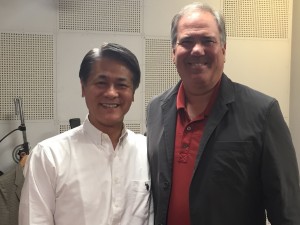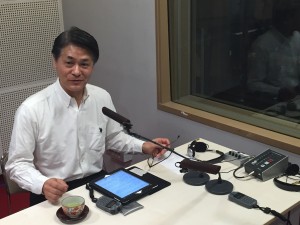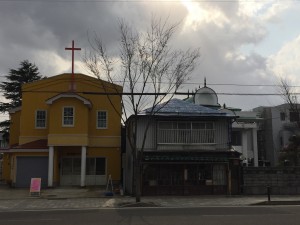And after some days Paul said to Barnabas, “Let us return and visit the brothers in every city where we proclaimed the word of the Lord, and see how they are.” Acts 15:36 (ESV) —
It brings great joy when I visit the churches that have been started and supported by White Fields and I find them healthy and strong. That is what I found in Japan when I went to visit in April.
I want to tell you about two pastors whom White Fields has supported in the past—Pastors Hirooki Sekine and Tomio Ohashi. Both of their churches are healthy and doing well. Both pastors have also moved into new ministry opportunities. God has expanded their ministries so that they are now blessing other churches.

When I spoke with Pastor Sekine, he acknowledged that without White Fields’ support, Shiroyama Christ Church would not be in existence today. It was a blessing to hear his recollections of that time of partnership and to see how the Lord has blessed and enlarged his influence. He is still shepherding the local church, but he is also a radio preacher and host of LifeLine television show, a one-hour program that highlights the testimonies of well-known Japanese people, such as athletes or businessmen who have become Christians. Pacific Broadcasting is the Christian media ministry in Japan and it produces these shows. White Fields’ missionary representative and TEAM missionary Tim Selander is the general manager. This is a great networking partnership between White Fields church-planting ministry and the evangelical community in Japan.
Pastor Sekine writes:
I started the church plant in 1982 and received support from White Fields for three years. In the second of those three years, Reverend and Mrs. Poole, along with Satake-sensei, came to visit. I went to the train station to meet them, and as soon as he saw my face, Reverend Poole called out, “Pastor Sekine!” We had never met before, so I wondered how he knew me among all the people there, but he said, “I always pray for you with your photo in front of me!” I am so thankful to have been prayed for in that way. I also always recall another thing that Reverend Poole said to me at that time, Mark 7:37 “He has done everything well.” Those words were a great encouragement to me during the church-planting years.

Our church, Shiroyama Christ Church is in the city of Odawara, in Kanagawa Prefecture. There are now about 80 people attending worship each week.
Currently, of course, my main work is being pastor of Shiroyama Christ Church. But I am also the host of LifeLine television and a preacher on ‘Light of the World’ radio program. The Pacific Broadcasting Association produces these programs. Local churches all over Japan band together to pay for the air time and the broadcast of these programs over local radio and TV stations to evangelize their communities. These church groups also hold evangelistic meetings in the broadcast areas and I travel around the country to bring the message to many of these meetings. There is very, very little gospel broadcasting in Japan; most of it is being done by PBA and their church association groups.

During my work as a church planter, White Fields was my sole supporter, and I am extremely grateful for their financial backing. More than anything, I was so moved by their care and support for pioneer church-planting evangelists. In the course of writing the monthly reports, I realized that they were not just for White Fields—those reports allowed me to look back and evaluate how I was doing evangelism—they were so useful to me, personally! I also cannot express how great an encouragement it was to me to participate in the KDK/White Fields’ Seminars during the time of my church planting. The research and analysis that Sakata-sensei and the others shared were so helpful. Also, as I struggled with problems, such as very few people coming to church or discord among members, it was so good to be able to share those experiences with the other church planters and encourage each other at the seminars.
God Bless,
Hirooki Sekine
I also had the opportunity to reunite with Pastor Tomio Ohashi.

When he planted his first church, it took him 20 years to establish the church and to support a new pastor so that he could move on to plant another church in a new community.
White Fields supported him during his second church-planting ministry in Nasu. This church plant took only five years to reach the same stage of establishment—not twenty years. Tomio credits this success to the answered prayers of White Fields prayer partners. He said there were so many answered prayers during the second church-planting phase that things just moved more rapidly. Then at the end of our support for the Nasu church they began a work in Otawara. We gave an extended year of support to get them started but the Nasu church sustained that new work. Now just five years later the Otawara church is ready to start a new church plant in another community.
This clearly demonstrates one of the greatest key traits of White Fields—the carrying out of the Great Commission through the reproduction of disciples and churches. White Fields’ church planters have been successfully planting churches for 62 years, and many of them have birthed new churches by the grace of God. Japan is where it all started (You can read more about White Fields’ history at https://whitefields.org/////////////about/our-history.
Donate to support church planting ministry
Japan is still in desperate need of the gospel.
Fifty-two percent of the Christian population in Japan is over 60 years old, so the gospel needs to reach the younger generations. It is also estimated that fewer than 300,000 Japanese people in the entire nation attend church on Sunday. (Statistics provided by the Pacific Broadcasting Association)
In a Gallup poll on religion in Japan we discover this:
- Of the 30 percent of adults who claimed to have a religion, 75 percent considered themselves Buddhists, 19 percent Shintoists and 12 percent Christians, according to the Gallup Organization. Japanese youth revealed even more alarming statistics. Of the 20 percent who professed to have a religion, 60 percent called themselves Buddhists, 36 percent Christians and Shintoists. (It is possible that the syncretistic nature of Japanese with regards to religion may account for why many teens identify themselves as Christian but do not attend church. They are also practicing Shinto religion too. That may lead to other statistics in this poll—this is my analysis after speaking with Japanese pastors)
- Delving into more specific attitudes, the poll also found a note of hopelessness in the responses to questions related to morality, spirituality and general views about life.
- “And there is little evidence of eternal hope, although a considerable number do believe in some form of life after life,” noted Gallup. And “there is little belief in ‘absolutes,’ and this is true across the all-generational groups.”
- In comparison to teens in the United States, Japanese teens showed a pessimistic outlook on life. Previous studies found that 85 percent of teens in Japan wondered why they existed while 22 percent of U.S. teens had the same thought. Additionally, 13 percent of Japanese teens always see a reason for their being on Earth compared to 76 percent of teens in the U.S, and 11 percent of Japanese teens wished they had never been born while 3 percent of U.S. teens wished the same.
Read more at: http://www.christianpost.com/news/1549/#LxjrD0deltpRcWQR.99
- Religion in Japan is characterized by syncretism; meaning, most people identify with more than one religion and sometimes combine two or more. Religions that are commonly synced include Shinto and Buddhism.
- These religions aren’t necessarily alternately practiced, but it is common for them to be interwoven.
- Most Japanese, however, don’t identify with any religion at all. According to recent studies, over 60 percent of people in Japan say they are atheists.
Read more at: http://www.religionfacts.com/stats/countries/japan
Our pastors are presenting the genuine gospel of Salvation by grace through Faith alone in Jesus alone.
They do not practice the syncretism that is characteristic of the majority in the culture. This can be a very lonely ministry. But we bring hope through the prayer ministry.
While I was in Japan, I had the opportunity to visit one of our current church planters, Pastor Kazuhiko Saito. He is planting a church in Akita Prefecture, which has one of the highest suicide rates in the country. An article in the Japan Times, dated September 4, 2014, reported that Japan’s suicide rate, as a country, is roughly 60 percent higher than the global average, with 18.5 people out of every 100,000 committing suicide in 2012, according to a World Health Organization report. In 2012, 29,442 people committed suicide—20,888 were men and 8,554 were women.
When I shared with his small congregation that they might seem like just a few in a crowded community, but that there are hundreds of prayer partners across North America praying for them—tears filled their eyes. They were deeply moved by your commitment to pray for them. They were encouraged that they are not alone. Pray for Pastor Saito and his church.

The people of this country need the hope, love, and compassion of Jesus Christ that can be found in His body of believers. So Pastor Saito is reaching out to these desperately hopeless people with the good news of Jesus Christ. It’s our privilege to come alongside him and other church planters with prayer and financial support so that the gospel can go forth.
Your support for this congregation greatly encourages them. Pray that God will grant them grace and open the hearts of the people in Yokote to the Good News of the gospel of Jesus Christ. I look forward to visiting again in several years to see all that God has done.
May He receive all the praise and glory.